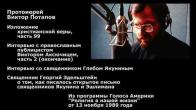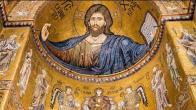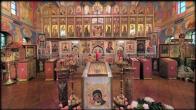You are here
St. Job (Joshua in schema) of Anzersk (Solovki)
6/19 March
Venerable St. Job (in the world, John) of Anzera, was born in Moscow in 1635. He began pastoral service as a priest in one of the parish churches. He lived a strictly monastic existence, fasting and continuously repeating the prayer: “Have mercy on me O Lord! Be merciful to me O Lord!" He showed forth amazing love for others. He was always seeking the opportunity to do something good for his neighbor. He took an active part in helping all those in need, showed concern for those who had been wronged and those who were innocent but suffering. He strengthened those who were spiritually weak, and lovingly and wisely enlightened, comforted and instructed those who had gone astray. His home was always open to the poor. After feeding them and giving them paternal counsel, he would bid them farewell comforted, and would give them as much as he could for their journey. If he ever inadvertently offended anyone, he would immediately repent and ask his forgiveness.
The good pastor’s reputation even reached Tsar Peter I. The Saint was commanded to serve in the palace church and was chosen to be the spiritual director for the Tsar and of the Court. Using his influence at court, the Saint strove to be of even greater use to the unfortunate. Visiting prisoners, he used the Word of God to sway the criminals from their path. He bolstered those unjustly convicted, helping them to be more patient. He also helped pay of the debts of those incarcerated as debtors.
With the passage of the years, Fr. John, who had dedicated himself to thinking on God, would leave his home only for church services. Yet, by using trusted intermediaries, he continued his charitable activities.
In 1701, he was falsely denounced to the Tsar. It was alleged that he had learned of an evil plot, but “as a spiritual father did not inform the authorities.” The venerable one was exiled to the Solovki Monastery and was tonsured a monk, with the name Job. After enduring many trials, Elder Job was released from his obedience, and retired to a life of silence in his cell. Upon learning of the struggler’s holy way of life and becoming convinced that he had been slandered, Tsar Peter I wanted his spiritual director to return to him. However, St. Job declined the offer. In order to pursue a more isolated life of silence, in 1702 he moved to the Anzera Scete of the Holy Trinity, where soon after the death of Eleazar, founder of the Scete, he was appointed its rector.
Calling to mind the words of the Lord “…unto whomsoever much is given, of him shall be much required…” (Luke 12:48), Hieromonk Job expended great efforts in fulfilling the tasks of his new position. A wise instructor, he taught everyone that the most important virtue was to humbly obey God and those in authority, and that unless they did so, they could not attain salvation. He instilled in them the habit of constant labor and care for their neighbors. He himself visited the sick, bathed them and dressed their wounds, and often would heal them of their ills through prayer. At the same time, he never neglected to perform the church services and the prayer rule.
In 1710, Venerable Job took upon himself the great Angelic Image [the great schema], with the name Jesus. Soon the Mother of God herself determined Hieroschemamonk Jesus’ future course. Together with St. Eleazar Anzersky (commemorated 13 January), founder and heavenly patron of the Scete, she appeared to him in a dream. The Mother of God told him that on a hill on Anzera Island henceforth to be known as the second Golgotha, a church dedicated to the Crucifixion of Jesus Christ was to be erected, and a scete established. Taking this marvelous dream as God’s blessing, in 1714 Elder Jesus moved to moved to the hill of Golgotha, and with the help of his disciples Schemamonk Matthew and Monk Makary, established the Golgotha-Crucifixion Scete, where he continued his difficult spiritual struggle.
In 1715 a wooden church dedicated to the Crucifixion of the Lord was erected.
As an example to the brethren, the elderly founder himself would often would chop wood, carry water up the hill, and prepare dough in the bakery. In his cell, the Elder was constantly busy with handicrafts. He would divide the money derived from this activity into three parts: the needs of the church, the needs of the brethren, and alms for the poor. He took nothing for himself, and his only possessions were a few religious books.
As a result of his God-pleasing way of life, the Saint was made worthy to receive special revelations. Because of his fervent prayers, the Most-holy Theotokos appeared to him in his cell, and indicated to him the exact spot on the hill where a well could be dug to provide water, so essential to the monastery. When the miraculous spring was opened, the Saint enlightened the brethren, saying, “Never be sorrowful or weak in spirit, but always hope and trust in God. Remember His promise: ‘A mother will sooner forget her children than I will forget you.’” With God’s help, the Saint was able to foresee the evil intentions of some strangers who approached him. He prayed, "O Lord, send sleep unto Thy servants who have become tired in their vain efforts to please the enemy.” They slept for five days and nights, and acquired true repentance. On another occasion, he punished some thieves, forcing to stand stock-still bearing the weight of all they had stolen, until they were able to pray for mercy.
God revealed to St. Jesus the time of his coming death. Quite some time before his death, he told the brethren that he was to die before the rising of the sun on a Sunday, the day of the Resurrection. Having dedicated his entire life to serving God and his neighbor, the humble spiritual struggler prepared for the appointed hour, repenting with compunction that he had done too little to please the Lord.
As he had predicted, the Saint was translated from his earthly life early in the morning, before the rising of the sun, on a Sunday, the Sunday of Orthodoxy, March 6, 1720.
In the minutes before his death, the Saint’s cell was illumined by an extraordinary light, a sweet fragrance filled the cell, and the chanting of a Psalm was heard (Psalm 41: 5).
Relics in cathedral - monthly calendar
| S | M | T | W | T | F | S |
|---|---|---|---|---|---|---|
|
|
|
|
1
|
2
|
3
|
4
|
|
5
|
6
|
7
|
8
|
9
|
10
|
11
|
|
12
|
13
|
14
|
15
|
16
|
17
|
18
|
|
19
|
20
|
21
|
22
|
23
|
24
|
25
|
|
26
|
27
|
28
|
29
|
30
|
31
|
|
PARISH LIFE
Address of our Cathedral
While all the materials on this site are copyrighted, you may use them freely as long as you treat them
with respect and provide attribution on the Russian Orthodox Cathedral of St.John the Baptist of Washington DC.









